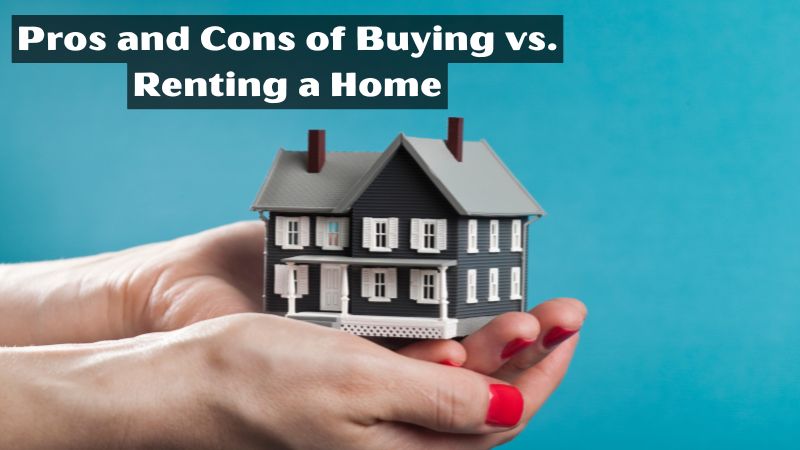Deciding between buying or renting a home is a big life decision. Each option has its own perks and challenges. The right choice depends on your lifestyle, finances, and long-term goals.
This blog will break down the pros and cons of both buying and renting so you can make a smart decision that works for you.
Pros of Buying a Home
1. Building Equity
When you buy a home, your mortgage payments build equity. That means you’re putting money into something you own. Over time, as you pay down your loan, your share of the home’s value grows. You can later borrow against this equity or use it to fund your next move.
2. Stability
Buying a home gives you a sense of stability. You don’t have to worry about your lease ending or rent going up. You can stay for as long as you like. This is especially helpful for families with children who want to stay in the same school district.
3. Freedom to Customize
As a homeowner, you have full control over the space. Want to paint the walls purple or renovate the kitchen? Go ahead. There are no landlord rules limiting your creativity. Your home truly becomes yours.
4. Potential Investment Growth
Real estate often increases in value over time. If the housing market is strong, your home could be worth much more in the future. This makes buying a home a potential investment, giving you more financial security.
Cons of Buying a Home
1. Expensive Upfront Costs
Buying a home comes with big upfront costs. You’ll need a down payment, closing costs, inspection fees, and more. These expenses can add up fast and make buying hard for first-time buyers.
2. Ongoing Maintenance
Homeownership means you’re responsible for everything. Roof leak? You fix it. Broken heater? That’s on you. Maintenance can be costly and time-consuming. Unlike renting, there’s no landlord to call for repairs.
3. Less Flexibility
Buying a home ties you down. If you need to move for a job or personal reason, selling your house can be stressful and slow. Renting offers more flexibility if you like to move often or are unsure about where you want to live long-term.
4. Property Value Risks
The housing market goes up and down. If property values drop, your home may be worth less than what you paid. This can be a financial setback, especially if you need to sell during a downturn.
Pros of Renting a Home
1. Lower Upfront Costs
Renting is usually more affordable at the start. You may only need to pay a security deposit and first month’s rent. There’s no need to save for a large down payment, which makes renting more accessible.
2. No Maintenance Worries
When you rent, the landlord handles maintenance and repairs. If the sink clogs or the heater breaks, just make a call. This saves you time, money, and stress, especially if you’re not handy with tools.
3. Flexibility to Move
Renting offers the freedom to move easily. Whether you want to explore a new city or take a new job, you’re not tied down. This is perfect for people who travel often, move frequently, or are still figuring out where they want to settle.
4. Access to Amenities
Many rental properties include access to perks like pools, gyms, and security systems. These amenities can be expensive to own privately. With renting, they’re often included in your rent at no extra cost.
Cons of Renting a Home
1. No Equity Building
When you rent, your monthly payments go to the landlord—not into building equity. Over the years, you’ll have spent thousands without owning anything in return. This makes it harder to build long-term wealth.
2. Rising Rent Costs
Rent prices can increase each year. You might start at an affordable rate, but over time it may become too expensive. Unlike a fixed-rate mortgage, rent doesn’t stay the same and can go up with little notice.
3. Limited Control
Renters often have restrictions. You might not be allowed to paint the walls, have pets, or make changes to the space. You’re living in someone else’s property, which means fewer rights and less freedom.
4. No Tax Benefits
Homeowners get tax benefits like mortgage interest deductions and property tax write-offs. Renters don’t get these savings. This means renters may pay more in taxes without the advantages homeowners enjoy.
Buying vs. Renting: Which Is Right for You?
There’s no one-size-fits-all answer. It all depends on your goals and situation.
If you want long-term stability, have savings, and plan to stay in one place, buying may be the right choice. You’ll build equity, have control over your space, and invest in your future.
But if you need flexibility, have a tight budget, or don’t want maintenance responsibilities, renting could be better. You can move when you want, avoid big costs, and enjoy peace of mind.
Some people even do both—rent while they save, then buy when ready.
Key Questions to Ask Yourself
Before deciding, ask yourself:
- How long do I plan to live in one place?
- Do I have enough savings for a down payment?
- Am I ready for maintenance responsibilities?
- What’s the housing market like in my area?
- Do I want to customize my living space?
- What are my career and lifestyle plans?
Your answers will help guide your decision.
Final Thoughts
Both buying and renting have pros and cons. The right choice depends on your financial situation, lifestyle, and goals. What works for one person may not work for another.
Take your time. Do the math. Talk to a real estate expert if needed. Whether you buy or rent, the most important thing is finding a place that feels like home.

